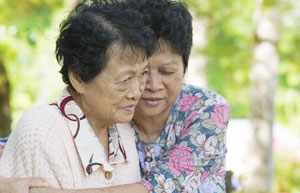Becoming a Caregiver of Elderly Parents
By: Other | June 10, 2014

Written by Francine Martinez, Ph.D.
Earlier this week we met with the Director of Community Relations for The Glenner Memory Care Centers, Mr. Marshall Stanek. The meeting’s focus was on networking and identifying how we can support each other with our respective clientele; the meeting, however, had a secondary impact on me, namely thinking about caregiving for my aging parents. I’ve been a caregiver on two occasions for terminally ill friends and remember the emotional and physical challenges of that role, yet thinking about the time when I may need to do that for my parents pulled on a different set of emotional heartstrings. The result was me wanting to prepare an article on the role of caregiver, as a means of preparing myself and also providing some insights for others.
I began my work staring at an article title in the Glenner newsletter, “…Caregiving is Not for Sissies”, took a deep breath and read on. The author emphasized the reluctant changing of roles; a mother’s resistance to recognizing that she needed help, and a daughter’s challenge in managing her ever-changing role with her mother’s diminishing capacity. I like predictability, this was not sounding predicable. Additional reading yielded 6 primary themes that I found important to outline in these few passages, ones that struck me as critical to prepare for and imperative to accept as part of this caregiving role.
You Will Have to Make Hard Choices.
There will be what appears to be an endless slew of medical decisions, financial decisions, and quality of life decisions that need to be made. It is predictable that there will be times when the aging parent wants to do the opposite of what everyone else wants; be prepared for the frustration and possible resentment when you are unable to persuade them towards a different option. There will also be times when they will not make any decision, leaving you feeling helpless and anxious.
To better prepare for such decision-making times sit down with your parent and discuss some of the care-taking and end-of-life issues that are hard to discuss; be brave when they are still healthy and able to think clearly about their wishes. Things to put on the conversation list: medical directives, legal questions/power-of attorney delegation, and clear actions involving financial and medical matters.
Being a Caregiver to an Elderly Parent is Not Comparable to Having Another Child.
With no harm intended we may enter into this relationship feeling like we must now completely take on the “parent-role”; doing so would be a mistake and disregarding the full life our parents have lead. The word “dignity” surfaces again and again in the literature on moving into a caregiving role, and it is one we must use when assessing our actions and next steps in this process. Yes, parents are “set in their ways”, they are slower and more difficult to please, and there is difficulty in them being truly engaged in the day-to-day events due to physical and mental limitations, however, they retain the human need to be involved and attached to others; being engaged with the “normal” family experience and being treated as an adult with important life experiences is imperative.
Caregiving Can be Embarrassing and Uncomfortable.
There will be moments in the course of the day that make us cringe, moments related to a loss of modesty and increasing difficulty with bodily functions. Our inclination may be isolate ourselves and our parents from the “outside world” for fear of publicly finding ourselves in one of these “embarrassing” situations. Isolating ourselves may lead to frustration and resentment, isolating our parents may lead to shame and guilt. Having someone new join your household sometimes means seeing and hearing more that you ever wanted to; giving them the respect to be themselves without shame offers you returns in affection that you could never imagine.
Your Relationships Will Be Strained.
Caregiving is often a thankless job, and the effects of that can cause a serious strain on all your relationships. Spouses in the household will be emotionally and physically stretched, leading to a possible increase in conflict and misplaced frustration. Children may also feel the burden of this stress, either through the adults in the household or in their own experienced loss of “the family”. It is also important to remember that the aging parent is undergoing a significant life change bringing its own set of issues related to independence, self-sufficiency, presence of children, and the health/mental health issues they are managing in their life. Also strained may be external relationships with siblings, other relatives, doctors, and close friends; the frustration and resentment of not feeling heard or understood regarding the challenges in this new role will often be at the foundation of these stressors.
There Will Be a Challenge in Balancing Quality of Life with Prolonging Life Issues.
A doctor’s role is predominantly to prolong life, their mission and calling is to keep us healthy and alive to the best of their ability. Our primary responsibility as a caregiver is to balance the medical directives with preserving a quality of life for our parents; as our parents become less responsive to medical treatment our role becomes even more difficult. Return to the first bullet in this article, “You Will Have to Make Hard Choices.” Maintaining positive and open relationships with health care personnel is imperative, asking questions and being an advocate for your parents is essential, and engaging your parent and others in decisions affecting this balance will be the made easier with the communication intact.
You Will Need a Break.
It is okay to take a break. In preparing this piece I’ve spoken to individuals who have been/are caregivers to aging parents and they all say the same thing, “You aren’t going to be any help if you are exhausted, rundown and emotionally shutdown”. At the end of this article are resources here in San Diego to find short-term caregiving that is affordable and available; we want to find an adult companion to spend time with our parent as we take care of ourselves. Often times caregivers think that having their parent in an assisted living facility is “the answer” to not feeling overwhelmed; clearly that is an option, yet if our parent is able and desires to remain in a home, you can find other ways to alleviate the mental and emotional strain. Take care of yourself.
Here are some local resources you may want to look at:
Glenner Memory Care Centers: Specialized Adult Day Programs and Family Resources
San Diego County Council on Aging
Partners in Caring
San Diego County Aging and Independence Services
Southern Caregiver Resource Center
SanDi Can
South County Action Network
Alzheimer’s Community Care Consortium
Latino Coalition for a Healthy California
California Association for Adult Daycare Services



